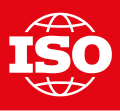International Organization for Standardization
International Organization for Standardization (ISO) is an independent, non-governmental international organization with a membership of 165 national standards bodies. Through its members, it brings together experts to share knowledge and develop voluntary, consensus-based, market relevant International Standards that support innovation and provide solutions to global challenges.
History[edit]
The ISO was established on 23 February 1947 with the aim of facilitating the international coordination and unification of industrial standards. Since then, it has published over 23,000 international standards covering almost all aspects of technology and manufacturing.
Structure[edit]
The organization follows a democratic structure where each member country is represented in the ISO General Assembly. The General Assembly is the highest authority of ISO. The operations are managed by the Central Secretariat based in Geneva, Switzerland. The work on standards is carried out by technical committees, subcommittees, and working groups, composed of industry experts, nominated by the member bodies.
Function and Principles[edit]
ISO operates based on the principle that each member country has one vote, regardless of the country's size or economic strength. This ensures that all voices are heard and that the development of standards is balanced and reflects mutual interests. The organization develops standards in a wide range of areas, including but not limited to, quality, safety, efficiency, interoperability, and environmental sustainability.
Standards Development[edit]
The process of developing an ISO standard is divided into six stages:
- Proposal stage
- Preparatory stage
- Committee stage
- Enquiry stage
- Approval stage
- Publication
During these stages, the draft standards are circulated among the member bodies for comments and voting. This process ensures that the standards are globally relevant and can be implemented worldwide.
Notable Standards[edit]
Some of the most well-known and widely implemented ISO standards include:
- ISO 9001: Quality management systems
- ISO 14001: Environmental management systems
- ISO 27001: Information security management systems
- ISO 45001: Occupational health and safety management systems
Impact[edit]
The adoption of ISO standards facilitates international trade by ensuring compatibility and interoperability of products, services, and systems. This not only helps businesses to enter new markets but also contributes to making the development, manufacturing, and supply processes more efficient, safer, and cleaner.
Criticism[edit]
Despite its significant contributions, ISO has faced criticism for the perceived complexity and cost of implementing its standards, especially by small and medium-sized enterprises (SMEs). There are also concerns about the organization's transparency and the influence of large corporations in the standards development process.
See Also[edit]
- International Electrotechnical Commission (IEC)
- World Trade Organization (WTO)
- Technical Barriers to Trade (TBT)
-
ISO Logo
-
Memory plaque of founding ISA in Prague
-
ISO Members 2020
Ad. Transform your life with W8MD's Budget GLP-1 injections from $75


W8MD offers a medical weight loss program to lose weight in Philadelphia. Our physician-supervised medical weight loss provides:
- Weight loss injections in NYC (generic and brand names):
- Zepbound / Mounjaro, Wegovy / Ozempic, Saxenda
- Most insurances accepted or discounted self-pay rates. We will obtain insurance prior authorizations if needed.
- Generic GLP1 weight loss injections from $75 for the starting dose.
- Also offer prescription weight loss medications including Phentermine, Qsymia, Diethylpropion, Contrave etc.
NYC weight loss doctor appointmentsNYC weight loss doctor appointments
Start your NYC weight loss journey today at our NYC medical weight loss and Philadelphia medical weight loss clinics.
- Call 718-946-5500 to lose weight in NYC or for medical weight loss in Philadelphia 215-676-2334.
- Tags:NYC medical weight loss, Philadelphia lose weight Zepbound NYC, Budget GLP1 weight loss injections, Wegovy Philadelphia, Wegovy NYC, Philadelphia medical weight loss, Brookly weight loss and Wegovy NYC
|
WikiMD's Wellness Encyclopedia |
| Let Food Be Thy Medicine Medicine Thy Food - Hippocrates |
Medical Disclaimer: WikiMD is not a substitute for professional medical advice. The information on WikiMD is provided as an information resource only, may be incorrect, outdated or misleading, and is not to be used or relied on for any diagnostic or treatment purposes. Please consult your health care provider before making any healthcare decisions or for guidance about a specific medical condition. WikiMD expressly disclaims responsibility, and shall have no liability, for any damages, loss, injury, or liability whatsoever suffered as a result of your reliance on the information contained in this site. By visiting this site you agree to the foregoing terms and conditions, which may from time to time be changed or supplemented by WikiMD. If you do not agree to the foregoing terms and conditions, you should not enter or use this site. See full disclaimer.
Credits:Most images are courtesy of Wikimedia commons, and templates, categories Wikipedia, licensed under CC BY SA or similar.
Translate this page: - East Asian
中文,
日本,
한국어,
South Asian
हिन्दी,
தமிழ்,
తెలుగు,
Urdu,
ಕನ್ನಡ,
Southeast Asian
Indonesian,
Vietnamese,
Thai,
မြန်မာဘာသာ,
বাংলা
European
español,
Deutsch,
français,
Greek,
português do Brasil,
polski,
română,
русский,
Nederlands,
norsk,
svenska,
suomi,
Italian
Middle Eastern & African
عربى,
Turkish,
Persian,
Hebrew,
Afrikaans,
isiZulu,
Kiswahili,
Other
Bulgarian,
Hungarian,
Czech,
Swedish,
മലയാളം,
मराठी,
ਪੰਜਾਬੀ,
ગુજરાતી,
Portuguese,
Ukrainian


